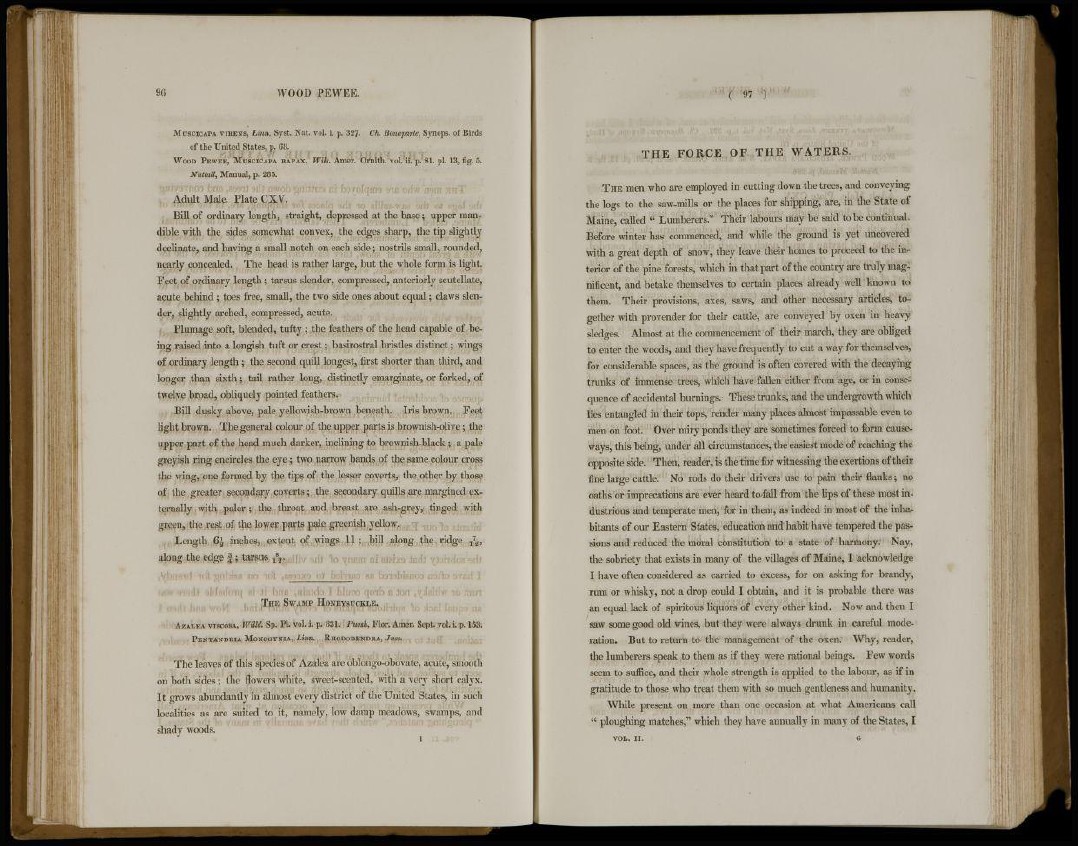
96 WOOD PEWEE.
M I T S C I C A P A V I R E N S , Linn. Syst. Nat. vol. i. p. 327- Ch. Bonaparte. Synops. of Birds
of the United States, p. 68.
W O O D P E W E E , M U S C I C A P A R A P A X , WHs. Amer. Ornith. vol. ii. p. 81. pi. 13, fig. 5 .
Nuttall, Manual, p. 285.
Adult Male. Plate CXV.
Bill of ordinary length, straight, depressed at the base; upper mandible
with the sides somewhat convex, the edges sharp, the tip slightly
declinate, and having a small notch on each side; nostrils small, rounded,
nearly concealed. The head is rather large, but the whole form is light.
Feet of ordinary length; tarsus slender, compressed, anteriorly scutellate,
acute behind; toes free, small, the two side ones about equal; claws slender,
slightly arched, compressed, acute.
Plumage soft, blended, tufty ; the feathers of the head capable of being
raised into a longish tuft or crest; basirostral bristles distinct; wings
of ordinary length ; the second quill longest, first shorter than third, and
longer than sixth; tail rather long, distinctly emarginate, or forked, of
twelve broad, obliquely pointed feathers.
Bill dusky above, pale yellowish-brown beneath. Iris brown. Feet
light brown. The general colour of the upper parts is brownish-olive; the
upper part of the head much darker, inclining to brownish-black ; a pale
greyish ring encircles the eye ; two narrow bands of the same colour cross
the wing, one formed by the tips of the lesser coverts, the other by those
of the greater secondary coverts; the secondary quills are margined externally
with paler ; the throat and breast are ash-grey, tinged with
green, the rest of the lower parts pale greenish yellow.
Length 6^ inches, extent of wings 11 ; bill along the ridge T
7 „
along the edge f ; tarsus
s^bftjwd • idl Hftbfes fffl lift ,mmm o* uairwa an boi^bianoo mfio srsd I
$5§d$ aJffgffttfff at 1l htm ,rcMdo I blvon qo*rb A Jon ^Mtln «*o rain
THE SWAMP HONEYSUCKLE.
A Z A L E A V I S C O S A , Willd. Sp. PI. vol. i. p. 831. Pursh, Flor. Amer. Sept. vol. i. p. 153.
P E N T A N D R I A M O N O G Y U I A , Linn. I I H O D O D E N D R A , JUSS.
pfrrax W>£ The lea-v ess ou ff itMhi s fsApleictioers omfq Awz avlaeial) aIrIe m o bmloondgso -oolb io&vsKatjea, Kactyuatdei, ttsuml ooodthJ
on both sides; the flowers white, sweet-scented, with a very short calyx.
It grows abundantly in almost every district of the United States, in such
localities as are suited to it, namely, low damp meadows, swamps, and
shady woods.
( 97 )
T H E F O R C E O F T H E W A T E R S .
THE men who are employed in cutting down the trees, and conveying
the logs to the saw-mills or the places for shipping, are, in the State of
Maine, called " Lumberers.''1 Their labours may be said to be continual.
Before winter has commenced, and while the ground is yet uncovered
with a great depth of snow, they leave their homes to proceed to the interior
of the pine forests, which in that part of the country are truly magnificent,
and betake themselves to certain places already well known to
them. Their provisions, axes, saws, and other necessary articles, together
with provender for their cattle, are conveyed by oxen in heavy
sledges. Almost at the commencement of their march, they are obliged
to enter the woods, and they have frequently to cut a way for themselves,
for considerable spaces, as the ground is often covered with the decaying
trunks of immense trees, which have fallen either from age, or in consequence
of accidental burnings. These trunks, and the undergrowth which
lies entangled in their tops, render many places almost impassable even to
men on foot. Over miry ponds they are sometimes forced to form causeways,
this being, under all circumstances, the easiest mode of reaching the
opposite side. Then, reader, is the time for witnessing the exertions of their
fine large cattle. No rods do their drivers use to pain their flanks; no
oaths or imprecations are ever heard tofall from the lips of these most industrious
and temperate men, for in them, as indeed in most of the inhabitants
of our Eastern States, education and habit have tempered the passions
and reduced the moral constitution to a state of harmony. Nay,
the sobriety that exists in many of the villages of Maine, I acknowledge
I have often considered as carried to excess, for on asking for brandy,
rum or whisky, not a drop could I obtain, and it is probable there was
an equal lack of spiritous liquors of every other kind. Now and then I
saw some good old wines, but they were always drunk in careful moderation.
But to return to the management of the oxen. Why, reader,
the lumberers speak to them as if they were rational beings. Few words
seem to suffice, and their whole strength is applied to the labour, as if in
gratitude to those who treat them with so much gentleness and humanity.
While present on more than one occasion at what Americans call
" ploughing matches,11 which they have annually in many of the States, I
VOL. II. G